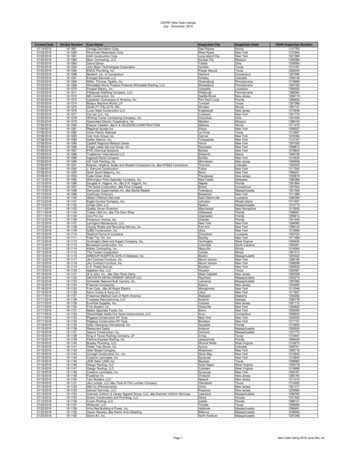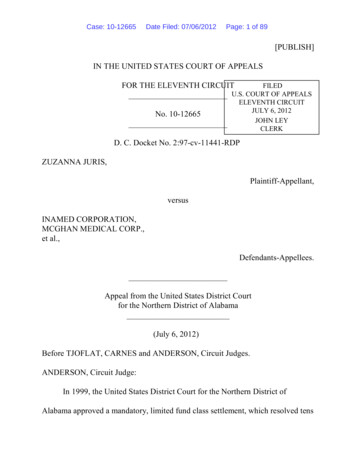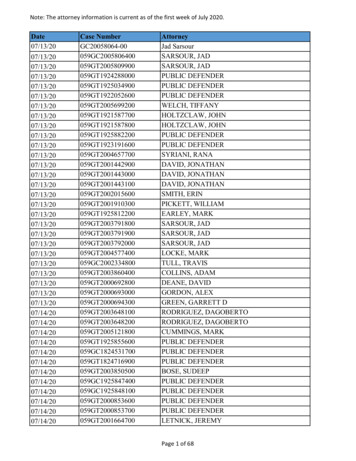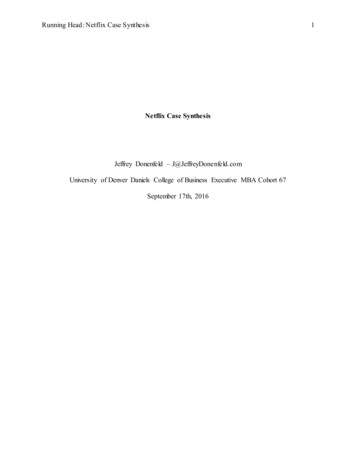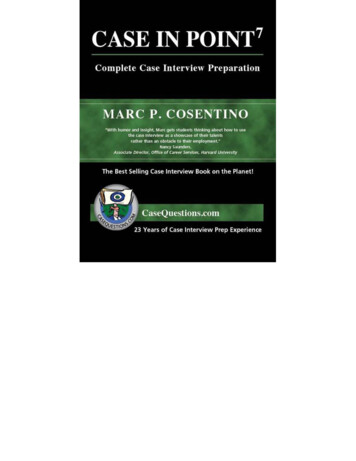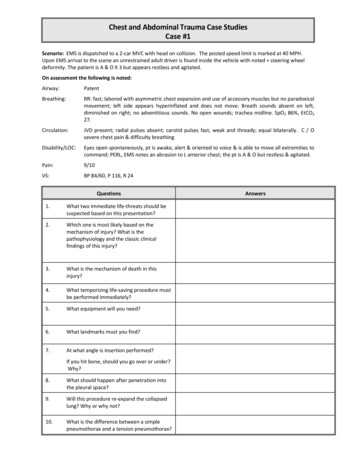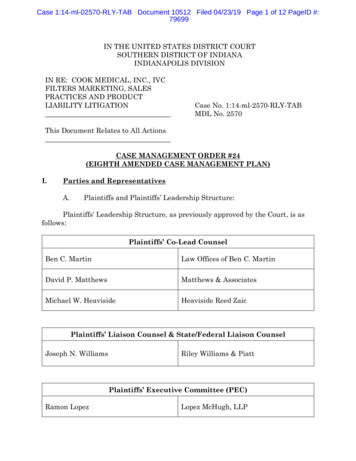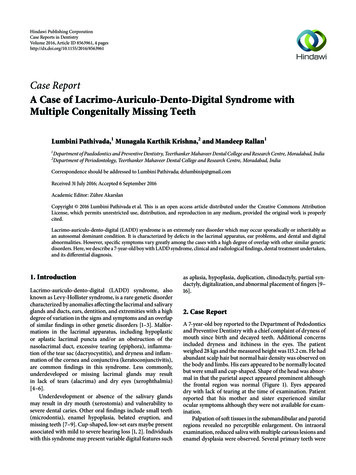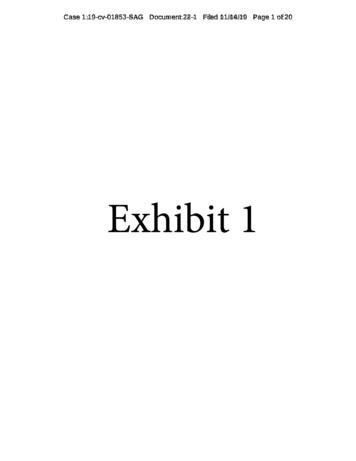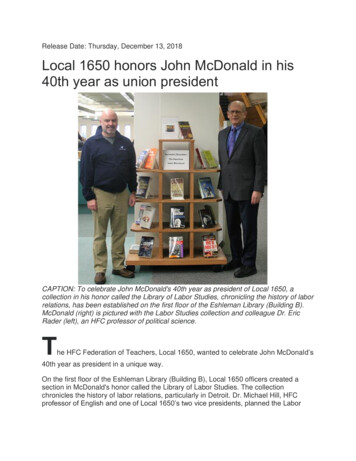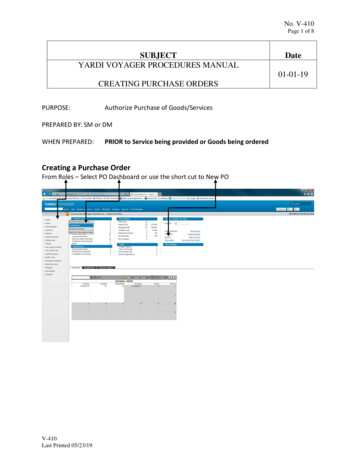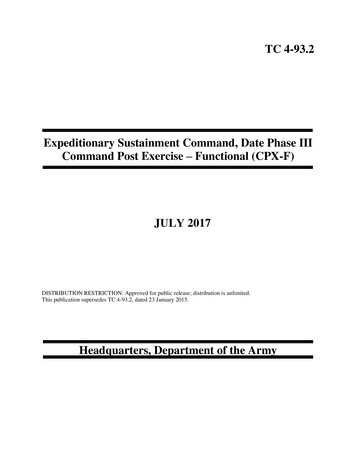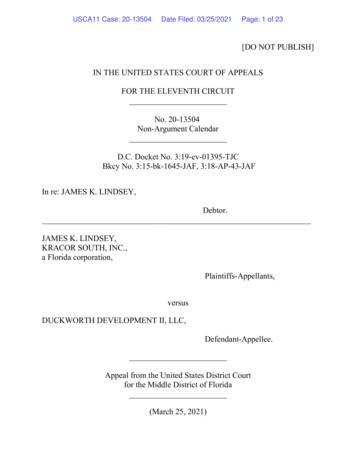
Transcription
USCA11 Case: 20-13504Date Filed: 03/25/2021Page: 1 of 23[DO NOT PUBLISH]IN THE UNITED STATES COURT OF APPEALSFOR THE ELEVENTH CIRCUITNo. 20-13504Non-Argument CalendarD.C. Docket No. 3:19-cv-01395-TJCBkcy No. 3:15-bk-1645-JAF, 3:18-AP-43-JAFIn re: JAMES K. LINDSEY,Debtor.JAMES K. LINDSEY,KRACOR SOUTH, INC.,a Florida corporation,Plaintiffs-Appellants,versusDUCKWORTH DEVELOPMENT II, LLC,Defendant-Appellee.Appeal from the United States District Courtfor the Middle District of Florida(March 25, 2021)
USCA11 Case: 20-13504Date Filed: 03/25/2021Page: 2 of 23Before MARTIN, GRANT, and LUCK, Circuit Judges.PER CURIAM:James Lindsey and Kracor South, Inc., appeal the district court’s orderaffirming the bankruptcy court’s final judgment for Duckworth Development II,LLC, on its claims to quiet title on two parcels of real estate it bought from Lindseyand Kracor, and to reform the warranty deed on those parcels. We also affirm.FACTUAL BACKGROUND AND PROCEDURAL HISTORYIn 2015, Lindsey filed a voluntary petition for Chapter 13 bankruptcy relief.In his schedule of assets, Lindsey listed a “fee simple” interest in two parcels of realproperty with a collective fair market value of 487,410.This real propertyconsisted of a commercial multi-tenant building and an adjacent vacant lot. Thecommercial building was subject to a mortgage held by Ameris Bank and Lindseyowed overdue taxes on both parcels.On February 16, 2017, Ameris Bank filed an action in state court to forecloseits mortgage on the commercial building. The action named as defendants Lindseyand Kracor, a Florida corporation in which Lindsey was the president and majorityshareholder.While the state foreclosure case was pending, Lindsey spoke to Mary Lundy,a realtor, about selling the parcels. Lindsey told Lundy that he needed to sell theparcels “quickly” or else he would lose them to the bank. Lindsey was therefore2
USCA11 Case: 20-13504Date Filed: 03/25/2021Page: 3 of 23looking for a “fire sale” to unload the parcels “very quickly” before “the lenders took[them] back.” Lundy referred Lindsey to Eric Bumgarner, a realtor specializing incommercial real estate. Bumgarner introduced Lindsey to Hank Duckworth, theowner of Duckworth Development, as a potential buyer. On April 4, 2017, Lindseysent the following email to Bumgarner: “I met with Hank and his attorney yesterday.All looks good for the purchase of both parcels, net to me 475,000. I need to get acontract asap where I can forward that to Ameris Bank which will postpone theforeclosure suit.”Bumgarner drafted a commercial contract for the sale of the parcels toDuckworth Development.The parties to the agreement were DuckworthDevelopment (the buyer) and “Kracor South, Inc. et al, a Florida Corporation” (theseller). The purchase price was 450,000. The contract provided that the “[s]ellerhas the legal capacity to and will convey marketable title to the [p]roperty bystatutory warranty deed . . . free of liens, easements and encumbrances of record orknown to [s]eller[.]” In the signature line for the seller, Lindsey printed his namefollowed by “Kracor-South.” Below that, Lindsey listed his title as “Pres. James K.Lindsey.” The contract was signed on April 6, 2017.On April 24, 2017, Duckworth Development’s attorney sent Lindsey a titlecommitment and cover letter. The letter identified “Kracor South, Inc. and JamesK. Lindsey” as, collectively, the seller. The letter provided that the seller had to3
USCA11 Case: 20-13504Date Filed: 03/25/2021Page: 4 of 23satisfy the requirements of the title commitment before closing, which included bothKracor and Lindsey executing a warranty deed as a condition to the issuance of atitle insurance policy.The title commitment also provided that DuckworthDevelopment was required to obtain a mortgage on the parcels before closing.On June 27, 2017, Lindsey filed with the bankruptcy court a motion to sellreal property. Lindsey, through counsel, represented that he had “entered into a salesagreement to sell” “his” properties to Duckworth Development for 450,000 (thecommercial building and vacant lot described above).Lindsey sought thebankruptcy court’s permission to sell the parcels according to the terms of thecontract “between [him]” and Duckworth Development. This sale would satisfy,Lindsey represented, the mortgage and tax liens on the parcels. The sale would alsoresult in 32,511.12 net proceeds “payable to [Lindsey].” Lindsey represented thathe was “not aware of any other claimed interest” in the property. The motion at nopoint mentioned Kracor. On July 25, 2017, the bankruptcy court granted Lindsey’smotion and authorized him to sell the parcels according to the contract’s terms. Thebankruptcy court ordered that the net proceeds from the sale had to be sent toLindsey’s Chapter 13 trustee.The closing occurred on July 7, 2017, and a warranty deed was executedbetween Kracor and Duckworth Development. Lindsey signed the warranty deed aspresident of Kracor, transferring Kracor’s interest to Duckworth Development, but4
USCA11 Case: 20-13504Date Filed: 03/25/2021Page: 5 of 23he didn’t sign it in his individual capacity. Lindsey also signed a title affidavit,swearing that Kracor owned the parcels and there were “no parties in possession ofthe [p]roperty other than [Kracor].” Following the sale, the mortgage and tax lienson the parcels were satisfied and Kracor received a check for 138,043.62. A newmortgage held by Synovus Bank in Duckworth Development’s name was placed onthe parcels.After the sale, Lindsey didn’t communicate with Hank Duckworth for sixmonths. Duckworth Development spent about 500,000 improving the parcels andleased portions of the commercial building to tenants. Lindsey didn’t contribute tothese improvements.On January 23, 2018, a title insurance agency prepared a report stating thatthe owners of the parcels were Duckworth Development and Lindsey. That sameday, Lindsey called Hank Duckworth to inform him that his attorney had “screwedup” and Duckworth Development could get the new mortgage on the parcels paidoff if Duckworth “played his cards right.” Then, on February 7, 2018, Lindseyemailed Hank Duckworth stating that Lindsey was the “50% owner” of the parcels.Lindsey wrote that he didn’t approve any of the ongoing improvements at theproperty, and requested a halt to construction “until an agreement between [him] andDuckworth [was] finalized in writing[.]” He also wrote that he didn’t authorize the5
USCA11 Case: 20-13504Date Filed: 03/25/2021Page: 6 of 23new mortgage and would seek to amend it to exclude his half interest. Finally,Lindsey demanded half of all rental income generated by the parcels.In response to Lindsey’s email, Duckworth’s attorney prepared a correctivewarranty deed reflecting that both Kracor and Lindsey were the grantors of theparcels. Duckworth’s attorneys sent the proposed corrective warranty deed toLindsey’s attorney, stating that: (1) Lindsey didn’t have a half interest in theproperty; and (2) it was a “mistake” to not have him individually execute thewarranty deed. Lindsey refused to sign the corrective warranty deed (against theadvice of his attorney).On April 11, 2018, Duckworth Development brought an adversary proceedingagainst Lindsey and Kracor in Lindsey’s ongoing Chapter 13 bankruptcy case.Count one of Duckworth Development’s complaint sought reformation of thewarranty deed and count two sought to quiet title. Duckworth Development allegedthat the warranty deed mistakenly did not reflect the parties’ agreement that Lindseywould sell his entire interest in the parcels.Although Lindsey’s Chapter 13 bankruptcy case had been pending for threeyears, on April 16, 2018—five days after Duckworth Development initiated theadversary proceeding—Lindsey requested that his bankruptcy case be dismissed.The bankruptcy court dismissed the case the next day.6
USCA11 Case: 20-13504Date Filed: 03/25/2021Page: 7 of 23On April 23, 2018, Duckworth Development moved the bankruptcy court toretain jurisdiction over the pending adversary proceeding. Lindsey objected to theretention of jurisdiction. He conceded that “the bankruptcy court ha[d] discretionarypower to retain jurisdiction over an adversary complaint following dismissal of theunderlying bankruptcy case” if cause is shown. Lindsey argued that the bankruptcycourt shouldn’t retain jurisdiction here because a dismissal of the adversaryproceeding wouldn’t prejudice or inconvenience the parties.The bankruptcy court granted Duckworth Development’s motion and retainedjurisdiction.The bankruptcy court concluded that dismissal of the adversaryproceeding was inappropriate because: (1) judicial economy would be best servedby retaining jurisdiction; (2) the bankruptcy court’s knowledge of the case wouldpromote fairness and convenience to the parties; and (3) the legal issues werestraightforward and best addressed by the bankruptcy court.The bankruptcy court held a two-day bench trial on Duckworth’s complaint,and then entered its findings of fact and conclusions of law. As to the reformationclaim, the bankruptcy court found that the parties had intended for DuckworthDevelopment to purchase the parcels in fee simple, and the warranty deed didn’treflect this agreement. The bankruptcy court found that the omission of Lindsey inhis individual capacity from the warranty deed was a mistake caused by DuckworthDevelopment’s attorneys, and this mistake wasn’t gross negligence. Reformation of7
USCA11 Case: 20-13504Date Filed: 03/25/2021Page: 8 of 23the warranty deed, the bankruptcy court concluded, was therefore the appropriateremedy.As to the claim to quiet title, the bankruptcy court concluded thatDuckworth established it held valid title to the parcels and Lindsey’s claimed halfinterest was invalid.Thus, the bankruptcy court entered final judgment inDuckworth’s favor.Lindsey moved for rehearing, arguing that: (1) the bankruptcy court lackedsubject matter jurisdiction over the adversary proceeding; (2) DuckworthDevelopment lacked standing to bring the adversary proceeding after Lindsey’sbankruptcy case was dismissed; (3) Lindsey hadn’t consented to the bankruptcycourt entering final judgment, which was necessary because the adversaryproceeding was a non-core proceeding; (4) Duckworth Development had failed toprove there was a mutual mistake in the warranty deed that justified reformation;and (5) the bankruptcy court erred by finding that Duckworth’s attorneys weren’tgrossly negligent in drafting the warranty deed.The bankruptcy court denied the motion. The bankruptcy court concluded ithad subject matter jurisdiction over the adversary proceeding under 28 U.S.C.1334(b) because it was “related to” Lindsey’s Chapter 13 bankruptcy case andestate.The bankruptcy court then concluded that the dismissal of Lindsey’sbankruptcy case didn’t divest it of jurisdiction because “related to” jurisdictionexisted at the time the adversary complaint was filed. And Duckworth Development8
USCA11 Case: 20-13504Date Filed: 03/25/2021Page: 9 of 23had standing, the bankruptcy court concluded, because it had suffered a concreteinjury that could be redressed following the retention of jurisdiction. Finally, thebankruptcy court found that Lindsey had consented to the entry of final judgment—even though the adversary complaint was a non-core proceeding—under a local ruleproviding that a party is deemed to consent to the bankruptcy court enteringjudgment if the party didn’t timely file a motion addressing the bankruptcy court’sjurisdiction. 1Lindsey and Kracor appealed the bankruptcy court’s judgment to the districtcourt. The district court affirmed, concluding that the bankruptcy court didn’t abuseits discretion in retaining jurisdiction and “committed no errors of law and made noclearly erroneous factual findings.” Lindsey and Kracor timely sought our reviewof the bankruptcy court’s judgment.STANDARDS OF REVIEW“As the second court to review the bankruptcy court’s judgment, we examinethe bankruptcy court’s order independently of the district court.” Westgate VacationVillas, Ltd. v. Tabas (In re Int. Pharmacy & Discount II, Inc.), 443 F.3d 767, 770(11th Cir. 2005). We review a bankruptcy court’s retention of jurisdiction over anadversary proceeding for an abuse of discretion. Fidelity & Deposit Co. of Md. v.1The bankruptcy court rejected Lindsey’s challenges to its factual findings becauseLindsey didn’t allege a change in the law or present any newly discovered evidence.9
USCA11 Case: 20-13504Date Filed: 03/25/2021Page: 10 of 23Morris (In re Morris), 950 F.2d 1531, 1535–36 (11th Cir. 1992). “[W]e reviewdeterminations of law made by either the district or bankruptcy court de novo, whilereviewing the bankruptcy court’s findings of fact for clear error.”WestgateVacation, 443 F.3d at 770. “[F]indings of fact are not clearly erroneous unless, inlight of all the evidence, we are left with the definite and firm conviction that amistake has been made.” Id.DISCUSSIONLindsey argues that the bankruptcy court: (1) lacked jurisdiction over theadversary proceeding; (2) erred in reforming the warranty deed without sufficientproof of a mutual mistake; and (3) erred in finding that Duckworth’s attorneys didn’tact with gross negligence.JurisdictionLindsey argues that the bankruptcy court had no jurisdiction over theadversary proceeding for four reasons. First, Lindsey argues that the bankruptcycourt didn’t have subject matter jurisdiction under 28 U.S.C. section 1334(b)because the outcome of the adversary proceeding couldn’t have impacted his estate.Second, Lindsey argues that the bankruptcy court erred by retaining jurisdiction overthe adversary proceeding after it had dismissed his bankruptcy case. The “generalrule,” Lindsey maintains, is that related proceedings should be dismissed when theunderlying bankruptcy case is terminated. Third, Lindsey argues that he didn’t10
USCA11 Case: 20-13504Date Filed: 03/25/2021Page: 11 of 23consent to the bankruptcy court adjudicating the adversary claims, which precludedit from entering final judgment because the adversary proceeding was non-core toLindsey’s bankruptcy case.And fourth, Lindsey argues that DuckworthDevelopment lacked standing because the bankruptcy court was without jurisdiction.Subject Matter Jurisdiction“A proceeding is within the bankruptcy jurisdiction, defined by 28 U.S.C.[section] 1334(b), if it ‘arises under’ the Bankruptcy Code or ‘arises in’ or is ‘relatedto’ a case under the Code.” Carter v. Rodgers, 220 F.3d 1249, 1253 (11th Cir. 2000).The test for determining whether a proceeding is “related to” a bankruptcy case “iswhether the outcome of the proceeding could conceivably have an effect on theestate being administered in bankruptcy.” Miller v. Kemira, Inc. (In re LemcoGypsum, Inc.), 910 F.2d 784, 788 (11th Cir. 1990) (quotation omitted). “An actionis related to bankruptcy if the outcome could alter the debtor’s rights, liabilities,options, or freedom of action (either positively or negatively) and which in any wayimpacts upon the handling and administration of the bankrupt estate.” Id. (quotationomitted). We look to whether subject matter jurisdiction existed “as of the date” ofthe filing of Duckworth Development’s adversary complaint. See id. at 788 n.20(“Subject matter jurisdiction should be determined as of the date that Kemira’s filedits motion seeking damages for the loss of use of its real property . . . .”).11
USCA11 Case: 20-13504Date Filed: 03/25/2021Page: 12 of 23We conclude that Duckworth Development’s adversary complaint was“related to” Lindsey’s bankruptcy case. “While [Duckworth’s] action against[Lindsey and Kracor] arose after the date of the bankruptcy petition, [its] suitturn[ed] solely on allegations of wrongdoing in the sale of property belonging to thebankruptcy estate.” See Carter, 220 F.3d at 1253. A recovery in DuckworthDevelopment’s favor would invalidate Lindsey’s claimed half interest in real estateworth 450,000—which is what ended up happening. As such, the outcome of theadversary proceeding could “impact [Lindsey’s] bankruptcy estate,” see id. at 1254,and could alter his “rights, liabilities, options, or freedom of action,” Miller, 910F.2d at 788. The bankruptcy court therefore had subject matter jurisdiction. See id.at 787–88.Retention of JurisdictionThe “dismissal of an underlying bankruptcy case does not automatically stripa federal court of jurisdiction over an adversary proceeding which was related to thebankruptcy case at the time of its commencement.” Fidelity & Deposit, 950 F.2d at1534. “Although dismissal of the bankruptcy case usually results in dismissal of allremaining adversary proceedings, 11 U.S.C. [section] 349 gives the bankruptcycourt the power to alter the normal effects of the dismissal of a bankruptcy case ifcause is shown.” Id. at 1535. A bankruptcy court considers three factors indetermining whether to retain jurisdiction over an adversary proceeding: “(1)12
USCA11 Case: 20-13504Date Filed: 03/25/2021Page: 13 of 23judicial economy; (2) fairness and convenience to the litigants; and (3) the degree ofdifficulty of the related legal issues involved.” Id. The decision on whether to retainjurisdiction over a pending adversary proceeding is “left to the sound discretion ofthe bankruptcy court.” Id. at 1534.Here, the bankruptcy court considered the three applicable factors andconcluded that they each weighed in favor of retaining jurisdiction. Lindsey doesn’tchallenge the bankruptcy court’s findings on any of these three factors. He insteadargues that once a bankruptcy case is dismissed, “there is nothing to proceed withand anything that occurred after the dismissal is void”—including the retention ofjurisdiction. Because the proceedings after the dismissal were void, Lindsey argues,the bankruptcy court lacked jurisdiction.We disagree. Fidelity & Deposit rejected the argument that a bankruptcycourt’s dismissal of a bankruptcy case without first “expressly retaining jurisdictionover the unresolved adversary proceeding terminate[s] the entire matter.” 950 F.2dat 1534.Because “an adversary proceeding in the bankruptcy court and thecompanion bankruptcy case are two distinct proceedings,” we explained, “expressretention over the adversary proceeding upon disposition of the related bankruptcycase is unnecessary.”Id.Thus, the fact that the bankruptcy court retainedjurisdiction over the adversary proceeding only after it dismissed the bankruptcycase didn’t divest it of jurisdiction. See id.13
USCA11 Case: 20-13504Date Filed: 03/25/2021Page: 14 of 23Consent to Entry of Final Judgment in a Non-Core ProceedingLindsey finally argues that he didn’t consent to the bankruptcy court enteringfinal judgment in the adversary proceeding, which couldn’t happen without hisconsent because it was “non-core” to the bankruptcy case. Again, we disagree. Ina non-core proceeding, the parties may consent to have a bankruptcy court “enterappropriate orders and judgments.” 28 U.S.C. § 157(c)(2). But “[n]othing in theConstitution requires that consent to adjudication by a bankruptcy court be express.”Wellness Int’l Network, Ltd. v. Sharif, 135 S. Ct. 1932, 1947 (2015). Rather, the“implied consent standard articulated in [Roell v. Withrow, 538 U.S. 580, 590(2003)] supplies the appropriate rule for adjudications by bankruptcy courts under[section] 157.” Id. at 1948. Under this standard, designed to “increas[e] judicialefficiency and check[ ] gamesmanship,” the “key inquiry is whether the litigant orcounsel was made aware of the need for consent and the right to refuse it, and stillvoluntarily appeared to try the case before the non-Article III adjudicator.” Id.(quotation omitted and emphasis added).The bankruptcy court found that Lindsey consented to the entry of finaljudgment. It did so based on Bankruptcy Local Rule 7001-1(k)(6), which providesthat:A party who seeks a determination that the Bankruptcy Court does nothave jurisdiction to enter final o
The bankruptcy court granted Duckworth Development’s motion and retained jurisdiction. The bankruptcy court concluded thatdismissal of the adversary proceeding was inappropriate because: (1) judicial economy would be best served by retaining jurisdiction; (2) the bankruptcy court knowledge of the case would ’s
